This page honors the most humble of Opera's servants - the Supers!
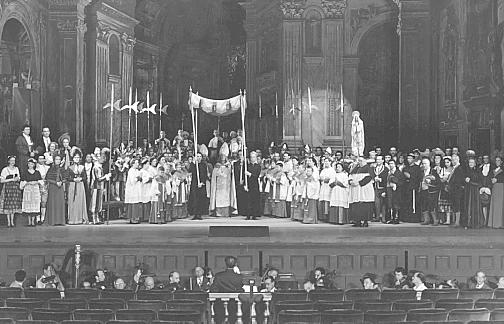

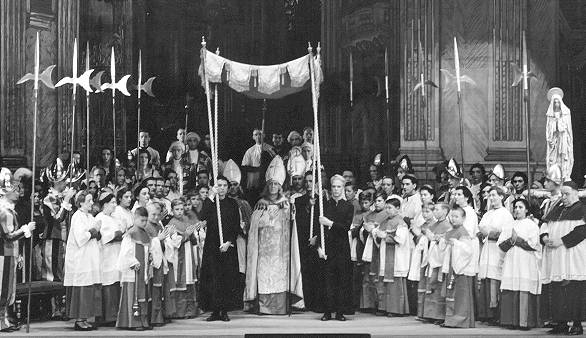
The guys with the halberds are all supers, as are the canopy bearers.
The author is holding the 2nd halberd from the left.
Beneath the canopy is the late Al Wheaton,
a shirt salesman by day - paymaster for the Supers by night.
Everyone else is a singer, including the children.
Salvatore Baccaloni, basso, as the Sacristan is at extreme right.
The word is actually short for "supernumerary. Sometimes they are called "spear carriers". The term "extra" just about covers it. Supers are useful in operatic crowd scenes, simply to fill the stage with people. They do not sing, nor are they professional actors - they sometimes just mill around or even stand still.
At other times, a few trusted supers might be allowed to take part, for example, in the changing of the guard in Carmen. One or two might light a lamp in Andrea Chenier. During my own supering career of several seasons I was called upon to help carry out the dead body of Abimelech in Samson and Delilah, and was one of two fan bearing slaves in Salomé.
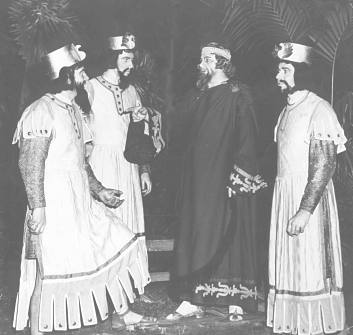
(Samson and Delilah, 1949-c., photo by Paul C. Tracy)
The high priests of Dagon (Robert Weede & supers, author 2nd from left)
At that time in the San Francisco company, the 2 senior supers usually acted as "curtain boys", wearing knee breeches and a powdered wig. (This tradition was started when an excited prima donna once yanked an ill clad curtain boy out with her to take a bow). Their duties were to sit on a chair, barely offstage, during each act and then hold the curtains to let the singers through for bows. I was able to fill in just one time as curtain boy for the Barber of Seville. I had the best possible view of Lily Pons, Eugene Conley, Enzo Mascherini, Italo Tajo, Salvatore Baccaloni and their antics (almost fell off the chair, laughing).
The more complex super roles required a fair amount of rehearsal. We were not paid for that, but did receive the sum of $1.00 per actual performance. However, we were glad to fill this function because it was a great way to see the entire opera season free for nothing and also be able to observe the singers and other staff at work. Sometimes this could be quite exciting, for example being there when Jussi Bjoerling rehearsed his first Manon Lescaut, or seeing Del Monaco and Tebaldi prepare for their first American appearance.
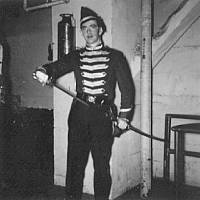
Carmen - 1949-c. |
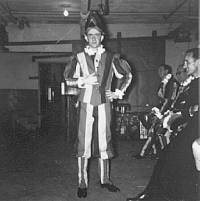
Supers horse around during Tosca - 1949-c. |
Mario Del Monaco Swipes My Hat
It must have been 1950 when the San Francisco season opened with Aida. The company had imported a large group of singers from La Scala, among them Renata Tebaldi and Mario Del Monaco, thereby stealing a march on the Met. It was on the west coast that these 2 singers made their first American appearances.It was opening night, and I was waiting just offstage. Del Monaco was pacing up and down like a cat - he was understandably nervous about his debut, but aside from that, his personal costumes had not arrived from Italy. Wardrobe had given him some stuff to wear, but he was unhappy about it. His headpiece was small and flimsy looking. He saw me standing there with my elaborate headgear and suddenly started a rapid fire volley of Italian, which I did not understand. It was obvious what he wanted however, - he wanted to trade hats. Of course I handed over my headgear and put on his. He seemed much happier and went out for his successful debut. Later, when we turned in our costumes, Cesare the wardrobe man said "Hey, that's not the hat I gave you." "See Del Monaco" I replied. "He's got it." That ended any difficulty. The photo in Time magazine, taken during the performance, showed Del Monaco wearing my hat. (For some unknown reason, Time cropped me out of the photo) - I never knew why.
Manon Lescaut - Inspirational Words from Jussi Bjoerling
One of the dramatic moments of Manon Lescaut comes in act III, when the ship sets sail from Le Havre to America. Des Grieux (Jussi Bjoerling), after pleading with the captain to be allowed to join Manon on board, runs up the gangplank to join passengers and crew (supers!) turns and waves to the crowd on the dock, and then says to us "Well boys, here we go with another load of fish for the States."General Advice from the Stage Director
Stage director Armando Agnini had only one fear - "Please, boys, don't make the people laugh."